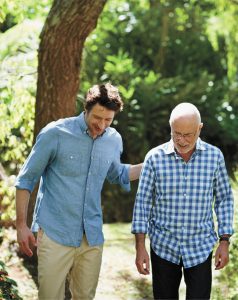By Janice Martin, Senior Living Specialist
 For years, I have been preaching to families to understand that the likelihood of their loved one giving them permission to movento an assisted living will not happen. Often, a parent has asked their children to never put them “in one of those places” at a time when their health was not a concern. Or a spouse makes the promise of “until death do us part.” Years later when they realize that it is no longer physically or emotionally possible to care for that person, they put off the decision to make a move to assisted living because of that promise. Now, they want their loved one to understand that things have changed beyond what they could have imagined. So, they ask for permission and they are devastated and uncertain what to do when they are not able to receive it.
For years, I have been preaching to families to understand that the likelihood of their loved one giving them permission to movento an assisted living will not happen. Often, a parent has asked their children to never put them “in one of those places” at a time when their health was not a concern. Or a spouse makes the promise of “until death do us part.” Years later when they realize that it is no longer physically or emotionally possible to care for that person, they put off the decision to make a move to assisted living because of that promise. Now, they want their loved one to understand that things have changed beyond what they could have imagined. So, they ask for permission and they are devastated and uncertain what to do when they are not able to receive it.
I had a recent health scare that put the subject of waiting for approval into perspective for me. I got up one morning a few weeks ago and I was dizzy and my left arm and hand felt as though they were asleep. I went back to bed and soon realized that I couldn’t move or speak. I couldn’t call out to my husband for help or sit up in bed. I lay there for a long time before he came to check on me and realized I was in a crisis. In my mind I was thinking if I could just sit up, I’d be fine. If I could just get to the kitchen table and have a cup of coffee, I’d be fine. But I was clearly NOT fine. My husband, in fear, asked me what I wanted him to do. Did I want him to call the ambulance? Should he drive me to the hospital? I was in complete denial of how critical the situation was. Finally, after waiting far too long I was able to ask him to take me to the hospital where I learned that I’d had a TIA, or mini stroke. Thankfully I had no damage, but the experience had a profound effect on me.
What I realized is that we must give our loved ones the confidence to make good decisions for us when we are no longer in a position to do so. We must talk with them beforehand and let them know what we want them to do in a crisis. But we also need to take that one step further. We need to tell them that if we do get to that point, the natural instinct is to deny how critical the situation is. Our loved ones must be strong and confident enough to understand that regardless of what we say in that moment, they must not wait for our permission to act.
This was true in my situation, and it also holds true when our loved ones are no longer safe in their current situation. They will not realize they are in a crisis situation and thereby not in a position to be making good decisions for themselves. They will not give you permission. You must act boldly on their behalf.
I recently spoke with a 90 year old client who has the power of attorney for her 82 year old friend. Her friend was in rehab and had been told she had to go to assisted living. My client took her to visit a community and her friend agreed to the move. However, she did not have the money to pay for more than two or three months. I explained that by moving there, she would exhaust all of her funds and would soon have to move again. Instead, I could help her find a place within her means with financial assistance, but it was on the far side of town. Her friend insisted that she wouldn’t move there because her friends wouldn’t visit her. I reminded my client that her friend had trusted her to be her power of attorney. That trust was put into place so that she would act in her friend’s best interest in the event that she was no longer able. Her friend could no longer make good decisions for herself and could not grasp the consequence of her refusal to act in a financially responsible manner.
I urge you to have a conversation with your loved ones. Develop a plan before a crisis. And in the event that the opportunity for that conversation has passed, I encourage you to move forward with love, compassion, and confidence to firmly decide for them.
Janice Martin of Senior Liaison of Central Florida Inc is available to help guide you through difficult decisions related to a move to assisted living. She is a senior living specialist, community resource liaison, and family advocate. She is also the author of “The Complete Guide to Assisted Living: Everything You Need to Know Before, During, and After a Move”. The book is now available on Amazon.com. For more information or for a free consultation, please call 352-477-1866 or email SeniorLiaisonCFL@gmail.com.
Senior Liaison of Central Florida
352-477-1866
seniorliaisoncfl.com
seniorliaisoncfl@gmail.com
 Central Florida Health and Wellness Magazine Health and Wellness Articles of the Villages
Central Florida Health and Wellness Magazine Health and Wellness Articles of the Villages



